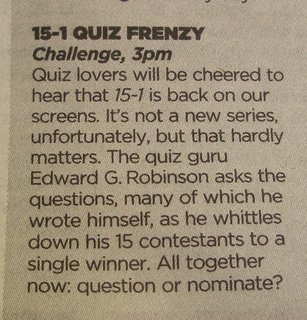Has technology moved on in the last 100 years? Not according to Simon Jenkins:
I rise each morning, shave with soap and razor, don clothes of cotton and wool, read a paper, drink a coffee heated by gas or electricity and go to work with the aid of petrol and an internal combustion engine. At a centrally heated office I type on a Qwerty keyboard; I might later visit a pub or theatre. Most people I know do likewise.
Not one of these activities has altered qualitatively over the past century
Well, I'm not sure about Jenkins' great-grandparents, but I'm sure mine never sat at a portable computer in one country, reading news from around the globe at the touch of a button - indeed adding their own tiny contribution to the global discussion, whilst watching live coverage of a tennis match beamed by satellite from the far side of the globe. Nor, I suspect, would they have spoken by videophone to their own parents (as I do to mine on a regular basis) or done their washing in an automatic machine. Hang on, mine's just finished its cycle.
Right, that's hung out now. Of course, many people would use a dryer in the same situation (Mum's just emailed to say it's snowed in England) but I don't need one here.
Jenkins takes his lead from David Edgerton, a man who knows a few things about the history of science, to come up with this:
No, research and development do not equate with economic progress.
I'm fairly sure there is a correlation between economic progress (at least wealth) and spending on R&D, although I don't have the facts to hand.
Better do a google.
Here we are: it seems China, the rising star of the world economy, now invests more in R&D than anyone apart from the US. Long-term, that will be massively important to their economy.
No, the computer is not a stunning technological advance, just an extension of electronic communication as known for over a century. No, the internet has not transformed most people's lives, just helped them do faster what they did before.
And the typewriter helped us do what the pen did, only faster. And the car helped us do what the horse and cart did, only faster. And the Bronze Age helped us do what the Stone Age did, only faster. This argument could be applied to anything, and it would be equally stupid. Computers have changed our lives for the better and continue to do so.
No, weapons technology has not transformed warfare, merely wasted stupefying sums of money while soldiers win or lose by firing rifles.
Hmm. Let's check those Iraq death figures again.
Technologically superior allies: just over 3000
Technologically inferior Iraqis (on both sides): 30,000? 100,000? 650,000?
No-one knows the exact casualty stats, but I bet if everyone had the same levels of training and weaponry (both affected by technological advances) at their disposal, the numbers would be closer together.
Here's some more:
Middle-class women probably do more manual labour than in the 19th century, assisted by such old technology as the washing machine and vacuum cleaner. Small wonder they still consume those ancient standbys, alcohol, nicotine, cannabis and opium.
I'm not buying this for a minute. More manual labour? Does anyone use a mangle these days? Or a carpet beater? If middle class women did less in Victorian times it was because they had servants to clean up after them. Fortunately the greatest effect of technology is the democratisation of society. In the post-war era, through to the sixties, when almost everyone could afford fridges, washing machines and televisions, the lot of the ordinary working class person improved immeasurably.
Still, I'm taken by the image of a smack-addled housewife struggling with the cumbersome Dyson on the stairs.
Nowhere in his article does Simon Jenkins mention the great advances in medicine that have been made over the last century, saving millions of lives through vaccination or surgery, or the fact that what used to be the preserve of the privileged (foreign travel and private transport, to name but two) are now available to the masses because of technology. And that these are spreading around the globe helping poorer countries develop. Want a
$100 laptop, Mr J? Well, you'll soon be able to buy one.
Some things ain't what they used to be. Let's be eternally thankful for that.










